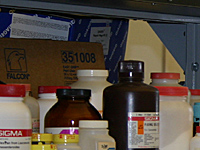John Welsh, Ph.D.

President/CEO, Vaccine Research Institute of San Diego
Associate Professor, Sidney Kimmel Cancer Center
Ph.D. Columbia University 1986
Postdoctoral Training: Columbia University and California Institute of Biological Research
Research Interests:
Our laboratory works on novel molecular methods to study cancer. Among these new methods has been Arbitrarily Primed Polymerase Chain Reaction (AP-PCR), a method that has been cited thousands of times primarily in the area of organism taxonomy, and was used to discover the Mutator Phenotype in cancer. A variation of this method, RNA Arbitrarily Primed Polymerase Chain Reaction (RAP-PCR) is similar to Differential Display and was used often to discover differential regulation of genes prior to the microarray revolution. Our own twist on microarrays was to use RAP-PCR as a means of significantly enhancing microarray sensitivity. In a second twist called Vertical Arrays, we use RAP-PCR to prepare the "spots" on microarrays and then probe the arrays to discover gene expression behavior one gene at a time, but in thousands of biological samples, simultaneously. A "boutique" method we worked out allows us to analyze the translation of individual genes in hundreds of samples simultaneously.
We have devised a robot for dissecting tumor tissue. Tumors are usually very genetically complex and most studies to date ignore this complexity. Our hypothesis is that metastasis develops in only a small part of a solid tumor, and this small region is usually obscured in studies of the whole solid tumor. The robot, called a Transverse Microtome, allows us to dissect tumors into tens of thousands of small pieces. Following dissection, molecular methods can be used to analyze the pieces. Naturally, when tens of thousands of pieces must be analyzed, novel methods must be devised to handle the large number of samples and we are working out these methods. We expect to be able to develop single tumor oncogenetic trees, which are similar to phylogenetic trees tracing the evolution of species, but for tumors, oncogenetic trees trace the evolutionary histories of the genetically different cell lineages that develop during progression. We expect that one of the branches on this tree will acquire the aggressiveness resulting in metastasis. By studying this branch directly, we expect to be able to learn both the mutations involved in progression and their order of occurrence. The advantage of this approach is that we will be able to focus very powerful methods of molecular biology on parts of the primary tumor that actually matter. The order of occurrence of mutations, the nature of the mutated genes, and their distribution (i.e. do they occur in the same cell lineages or in different lineages within the tumor) will enhance our understanding of the molecular basis of cancer and may lead to novel diagnostic paradigms. For example, in prostate cancer, knowing that a tumor harbors two dangerous mutations but that they do not occur in the same lineage may be of prognostic significance.
Representative Publications:
1. Welsh J, McClelland M. (1991) Genomic fingerprinting using AP-PCR and a matrix of pairwise combinations of primers. Nucleic Acids Res. 19:5275-5279.
2. Welsh J, Chada K, Dalal S, Cheng R, Ralph D, McClelland M. (1992) Arbitrarily primed PCR fingerprinting of RNA. Nucleic Acids Res. 20:4965-4970.
3. Wang Y, Ringquist S, Cho AH, Rondeau G, Welsh J. (2004) High-throughput polyribosome fractionation. Nucleic Acids Res. 32(10):e79.
4. Rondeau G, McClelland M, Nguyen T, Risques R, Wang Y, Judex M, Cho AH, Welsh J. Enhanced microarray performance with low complexity targets. (2005) Nucleic Acids Res. Jun 24;33(11):e100.
5. Risques R, Rondeau G, Judex M, McClelland M, Welsh J. (2008) Assessment of gene expression in many samples using vertical arrays. Nucleic Acids Research Jun;36(10):e60. May 12 [Epub].
Biography:
Dr. Welsh received his Ph.D. in chemistry from Columbia University. He did a brief post-doctoral fellowship at UC San Francisco funded by the California American Cancer Society, and then returned to Columbia to work with Argiris Efstratiadis, where he created the first cDNA library for the mouse egg. He then went on to the California Institute of Biological Research with Dr. Michael McClelland, where he was promoted to Assistant Professor. He joined the Sidney Kimmel Cancer Center in 1998 as Associate Professor, where has helped establish the Genomics and Bioinformatics Cores. He has taken a non-traditional approach to cancer research, merging elements of molecular biology, mechanical engineering and computing. Dr. Welsh became part of the Vaccine Research Institute of San Diego in 2009.
Home | About VRISD | News | Research | Publications
Careers At VRISD | How To Help | Contact Us
© VRISD 2006











